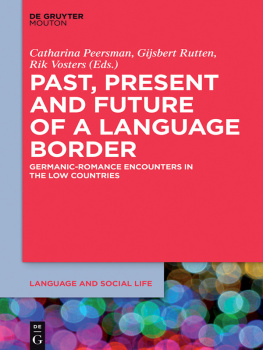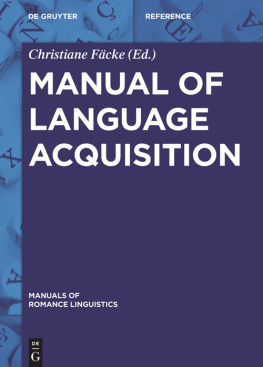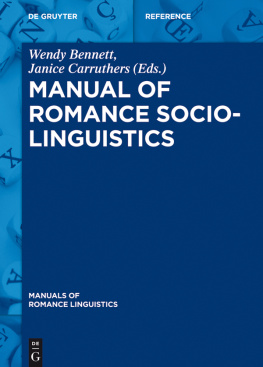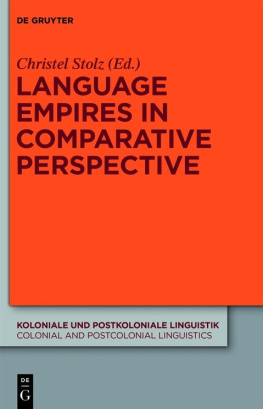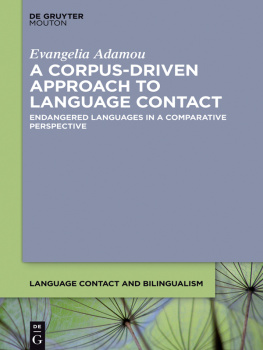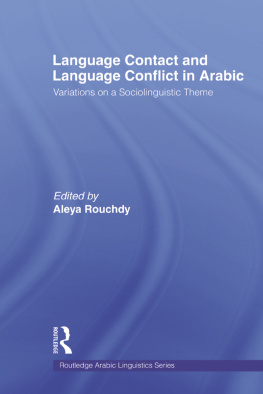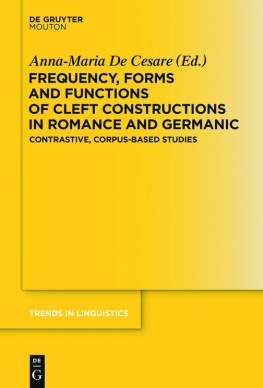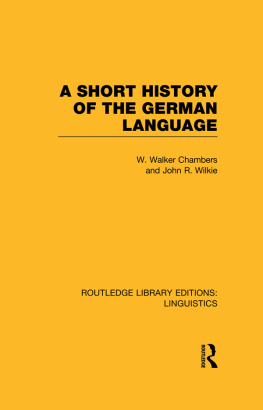Catharina Peersman, Gijsbert Rutten, Rik Vosters (Eds.)
Past, Present and Future of a Language Border


ISBN 978-1-61451-583-8
e-ISBN (PDF) 978-1-61451-415-2
e-ISBN (EPUB) 978-1-5015-0106-7
ISSN 2364-4303
Library of Congress Cataloging-in-Publication Data
A CIP catalog record for this book has been applied for at the Library of Congress.
Bibliographic information published by the Deutsche Nationalbibliothek
The Deutsche Nationalbibliothek lists this publication in the Deutsche Nationalbibliografie; detailed bibliographic data are available on the Internet at http://dnb.dnb.de .
2015 Walter de Gruyter GmbH, Berlin/Boston
Typesetting: PTP-Berlin, Protago-T E X-Production GmbH, Berlin
www.degruyter.com
Contents
Catharina Peersman, Gijsbert Rutten and Rik Vosters
Chapter 1
RomanceGermanic encounters along the language border: past, present and future
Jeroen Darquennes
Chapter 2
The dimensions of language conflict: an exploration
Roland Willemyns
Chapter 3
Trilingual tug-o-war: language border fluctuations in the Low Countries
Ulrike Vogl
Chapter 4
Standard language ideology and the history of RomanceGermanic
encounters
Catharina Peersman
Chapter 5
Constructing identity: language and identity in the narration of the Franco-Flemish conflict (12971305)
Willem Frijhoff
Chapter 6
Multilingualism and the challenge of frenchification in the early modern Dutch
Republic
Gijsbert Rutten, Rik Vosters and Marijke van der Wal
Chapter 7
Frenchification in discourse and practice: loan morphology in Dutch private
letters of the eighteenth and nineteenth centuries
M. C. A. Kessels-van der Heijde
Chapter 8
The use of languages in Maastricht in the nineteenth century: the press and
family archives
Magali Boemer and Jeroen Darquennes
Chapter 9
Language conflict in the educational realm: Eupen-Malmedy in the interbellum
period (19201940)
Kristine Horner and Jean-Jacques Weber
Chapter 10
Multilingual education and the politics of language in Luxembourg
Rudi Janssens and Joost Vaesen
Chapter 11
In contact and/or in conflict? Ethno-cultural markers, language and schooling
in post-war Brussels
Richard J. Watts
Chapter 12
Conceptualising language borders, language contact and language
conflict
Preface
We would like to thank the authors of the individual chapters, who produced the excellent pieces of scholarship which make thematic volumes such as this one possible. Some of the contributions in this book were first presented as conference papers at the 2012 Sociolinguistics Symposium in Berlin, where we hosted a thematic panel on Conflicts in the city, cities in conflict? Romance-Germanic encounters in the Low Countries. Thanks to all the presenters at that panel who reworked their contribution into a chapter for this book, and thanks to the other scholars who were not present in Berlin, but kindly agreed to submit a chapter for the present volume anyway.
We would also like to express our appreciation to the numerous colleagues who participated in the double-blind peer review process, and to Bettina Mller and Helen Bilton who helped in the prepation of the final manuscipt. Special thanks are likewise extended to the staff of De Gruyter Mouton, for their excellent advice and support throughout the publication process.
Finally, we were also privileged to work with the series editors, and Richard Watts in particular, who not only welcomed our book into the series, patiently guiding us through every step of the publication process, but also agreed to write the concluding chapter of the book. Thanks are also in order to Tomasz Kamusella for offering us some of his thoughts on the chapters at an earlier stage.
Catharina Peersman, Gijsbert Rutten & Rik Vosters October 2014
Author information
Magali Boemer is a member of the research group on plurilingualism (Pluri-LL) at the University of Namur, Belgium. She is currently working on her PhD project entitled Language, Education and Power A sociolinguistic study of language- in-education policy in the German-speaking Community of Belgium (1919-2012). She specializes in research on multilingualism and language-in-education policy (LEP) in language contact settings. Address for correspondence: UNamur, Rue de Bruxelles 61, B-5000 Namur, Belgium.
Jeroen Darquennes is professor of German and general linguistics at the University of Namur, visiting professor at the Universite Saint-Louis (Brussels) and affiliated researcher at the Mercator Research Centre on Multilingualism and Language Learning (Leeuwarden, The Netherlands). He is one of the general editors of Sociolinguistica. The international yearbook of European sociolinguistics (de Gruyter) and associate editor of Language, Culture and Curriculum (Routledge). In his research he mainly focuses on issues of language contact, language conflict and language policy and planning in European indigenous language minority settings. Address for correspondence: UNamur, Rue de Bruxelles 61, B-5000 Namur.
Willem Frijhoff (1942) studied and worked many years as a research fellow in history of mentalities and history of education at different scholarly institutions in France. At present he is emeritus professor in early modern history at the VU- University, Amsterdam, and holds the G.Ph. Verhagen chair in cultural history at Erasmus University, Rotterdam. His publications are about the history of education, culture and religion in Western Europe and the Atlantic area, in particular in the early modern Netherlands and France. Address: Jan van Ghestellaan 25, NL-3054CE Rotterdam.
Kristine Horner is Reader in Luxembourg Studies and Multilingualism at the University of Sheffield, where she is also Director of the Centre for Luxembourg Studies. She has published widely on language politics, language ideologies and multilingualism, including special issues of Language Problems and Language Planning (2009) and the Journal of Germanic Linguistics (2011), Introducing Multilingualism: A Social Approach (with J-J. Weber, Routledge 2012) and Multilingualism and Mobility in Europe: Policies and Practices (with I. de Saint-Georges and J-J. Weber, Peter Lang 2014). Address for correspondence: School of Languages and Cultures, University of Sheffield, Jessop West, S3 7RA Sheffield, United Kingdom.
Rudi Janssens is sociologist and senior researcher at the Brussels Information, Documentation and Research Centre (BRIO) at the Vrije Universiteit Brussel where he is in charge of the language-sociological research segment. He has published on language use in multilingual and multicultural cities and regions, language and identity and the impact of language policies. He is a member of the international consortium Mobilities and Integration in a Multilingual Europe (FP7). Address for correspondence: Vrije Universiteit Brussel, Pleinlaan 2 1050 Brussel.
Marina Kessels-van der Heijde is a retired English teacher and independent scholar. She studied cultural studies at the Open University and graduated in 1997. The subject of her research was the press in nineteenth-century Maastricht. In 2002, she published her dissertation Maastricht, Maestricht, Mestreech, the language proportions of Dutch, French and the Maastricht dialect in the nineteenth century (Maaslandse Monografieen 65, Hilversum 2002). She previously published on language choice in the press in Maastricht ( Verslagen en Mededelin- gen 2004: 1) and gives lectures about the subject of her dissertation. Address for correspondence: Dorpstraat 47 6438 JS Oirsbeek, The Netherlands.
Next page
